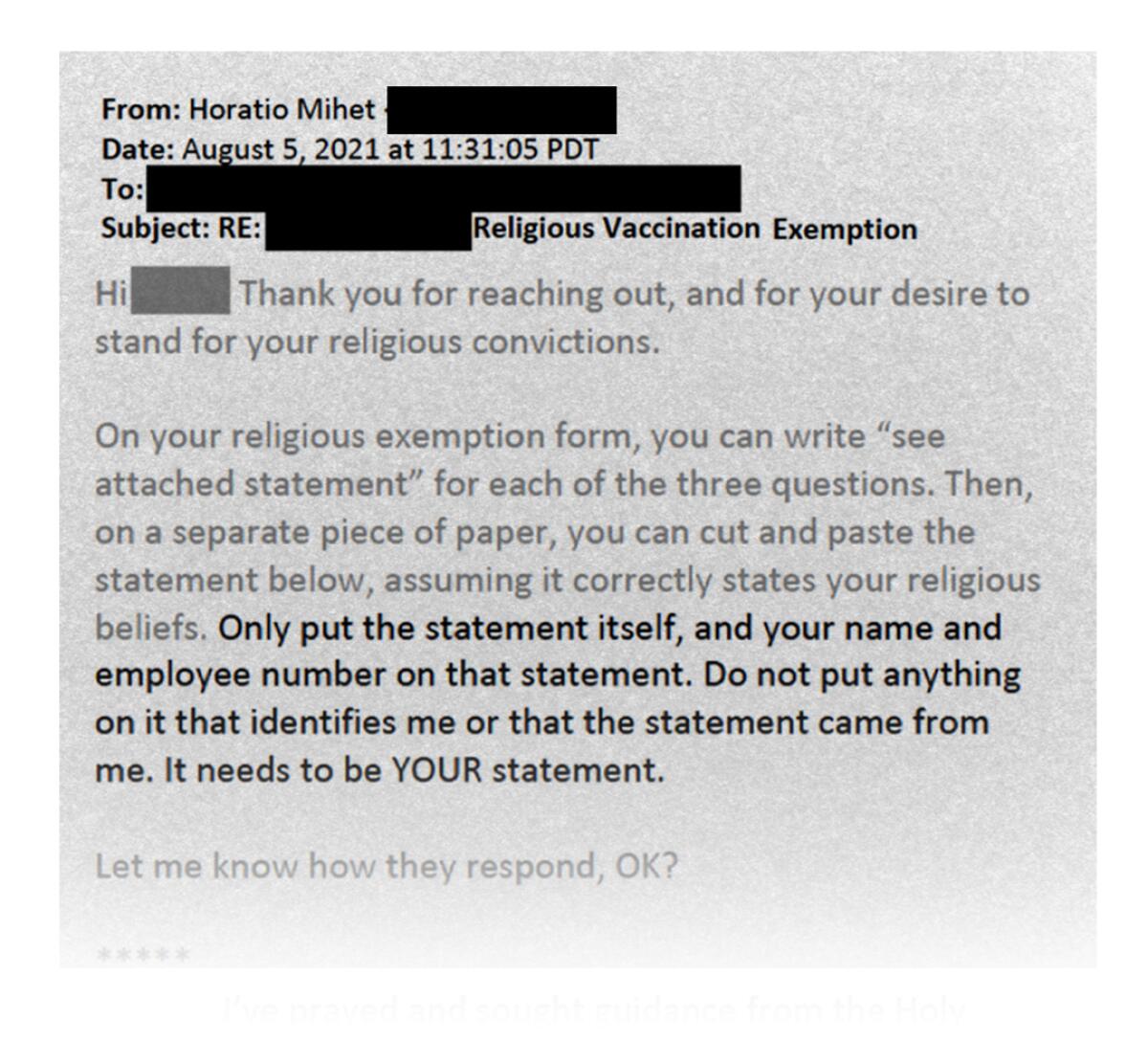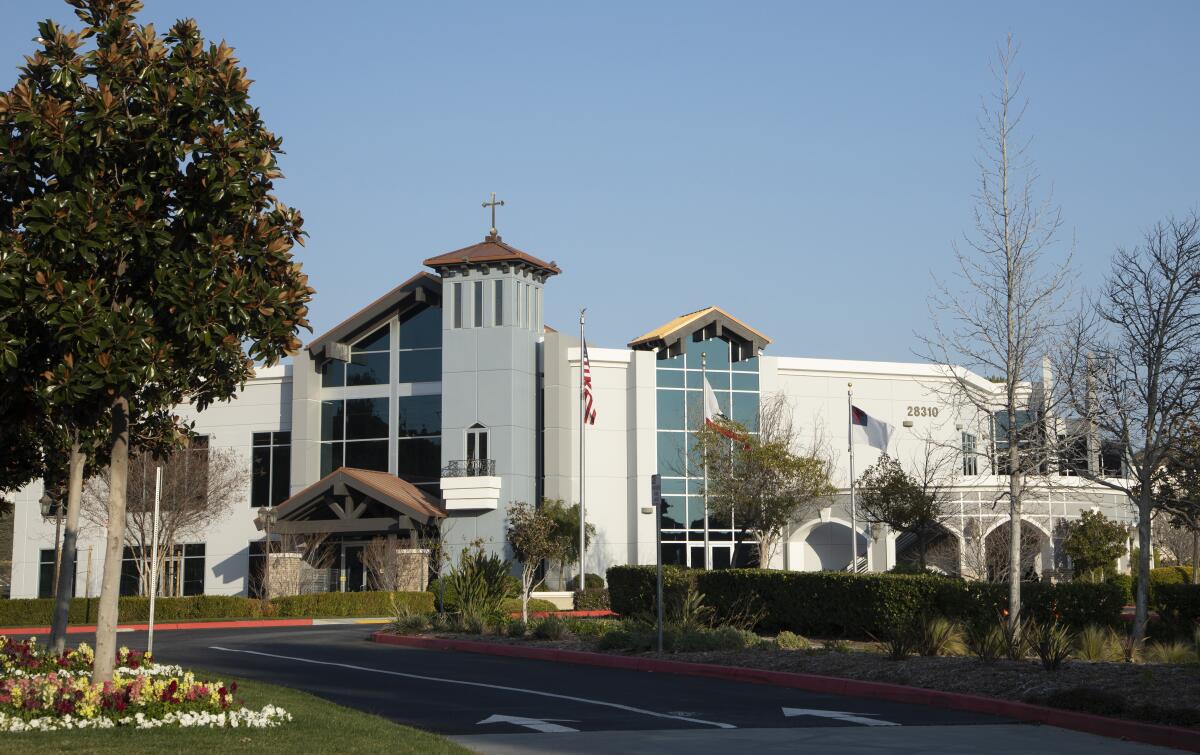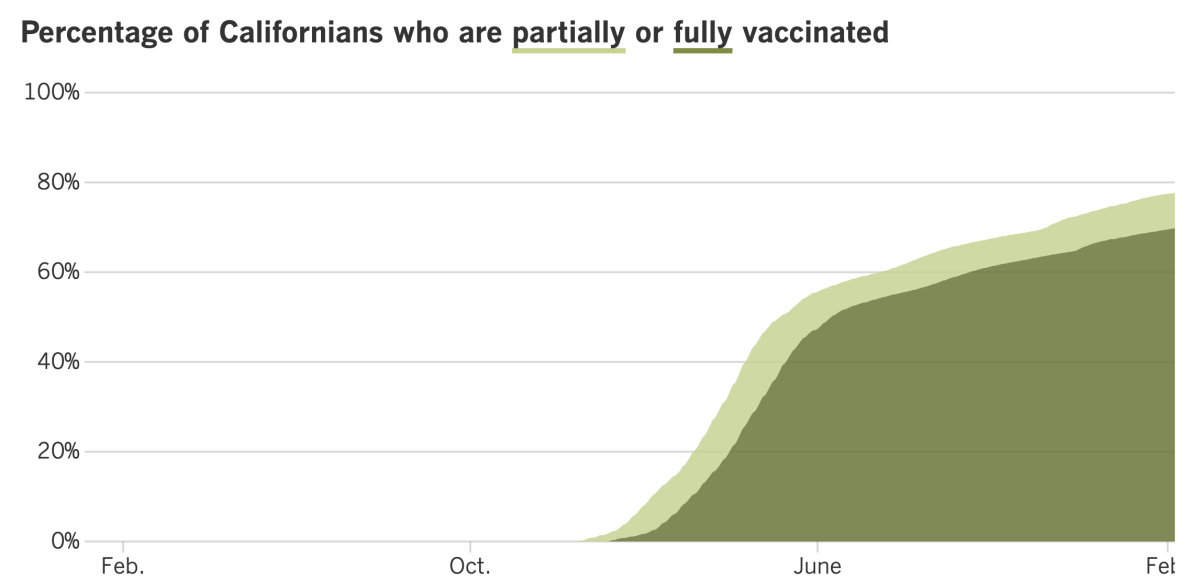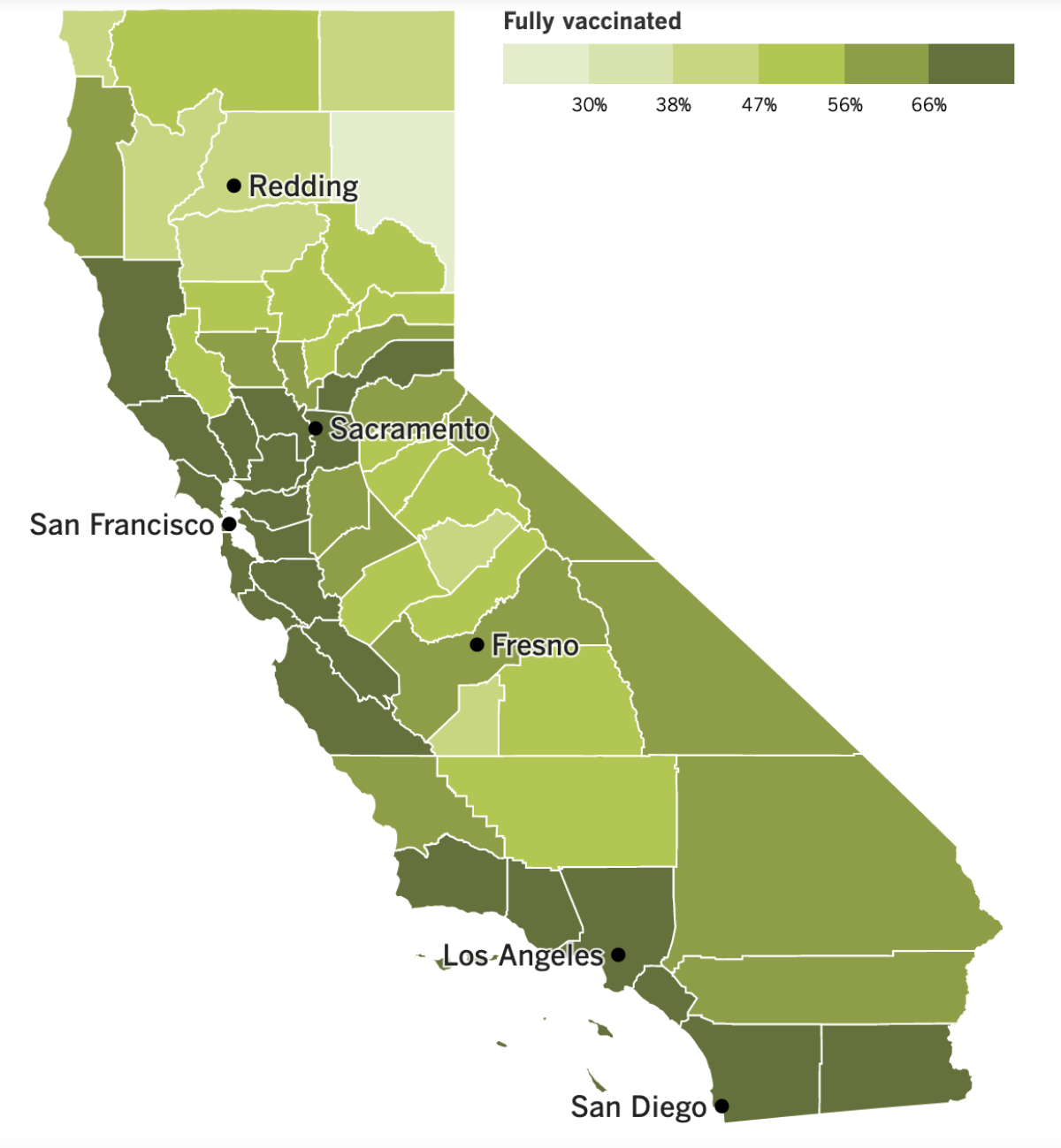Coronavirus Today: To evade the shot, simply ‘cut and paste’
Good evening. I’m Karen Kaplan, and it’s Tuesday, Feb. 8. Here’s the latest on what’s happening with the coronavirus in California and beyond.
Thousands of unvaccinated Californians are hoping that divine intervention will spare them from having to comply with their employers’ COVID-19 vaccine mandates. As some have discovered, divine intervention can be had for $195.
That’s what it costs to get an official-looking letter stating that any rule forcing a worker to get vaccinated is an “affront to a Christian.” The same goes for coronavirus testing requirements and even policies that say employees must wear face masks, the pastor of True Hope Ministry in San Clemente explained.
An employee of the Los Angeles Department of Water and Power gave the letter to his bosses to justify his request for exemption from the agency’s vaccine mandate. Granting the exemption is the only way to comply with federal laws against religious discrimination in the workplace, the pastor wrote.
My colleagues Laura J. Nelson and Connor Sheets obtained the letter through public records requests to the DWP and other public employers. The more than 2,200 pages of letters, emails and other records they received make clear that a cottage industry has sprung up to help people evade the COVID-19 vaccine by citing their religious beliefs.
The tactic works because both state and federal laws have created strong protections for religious freedom in the workplace. As we’ve discussed, the U.S. Equal Employment Opportunity Commission says employers should take “reasonable” steps to eliminate a “conflict between religion and work” if doing so won’t create an “undue hardship.” The laws apply even if an employee isn’t devout and isn’t associated with a mainstream faith. All that really matters is that their religious belief is sincere.
That’s what makes things tricky. Even if a professed religious belief isn’t sincere — and it often isn’t, legal experts say — proving that can be tricky and expensive. Skeptical employers may conclude that challenging a worker’s claim isn’t worth the hassle.
The result is a giant loophole that plenty of organizations are happy to exploit.
“It is ripe for abuse, and it is being abused,” said Nancy Inesta, a labor and employment partner at the BakerHostetler law firm in Los Angeles.
Calvary Chapel Chino Hills took just 13 minutes to respond to a teacher who sought help requesting a religious exemption. The church sent a link to a sample letter, an invitation to “pick up a signed exemption form” from its office, and contact information for a lawyer with the conservative Pacific Justice Institute. The church declined to discuss its response.

Horatio Mihet, vice president of legal affairs with Liberty Counsel, sent a five-paragraph statement to a vaccine-resistant hospital worker the day after he reached out for help.
“Cut and paste the statement below, assuming it correctly states your religious beliefs,” Mihet wrote. “Do not put anything on it that identifies me or that the statement came from me. It needs to be YOUR statement.”
Mihet told my colleagues it’s normal for lawyers to draft statements that clients can claim as their own.
David Hall, the pastor from True Hope Ministry, said the letter obtained by the DWP employee wasn’t for sale. The $195 fee covers a package of services that includes weekly group calls. The church also offers a class that advises students how to respond “if they say, ‘You got this off the internet,’” among other topics.
Some form letters cite objections that aren’t rooted in religion. And some include arguments that aren’t factually correct. Among the false claims: that COVID-19 vaccines are a form of gene therapy, and that they contain “animal parts” or “the DNA of a male aborted baby.”
To be sure, there are people who find form letters a useful tool for articulating their complicated yet sincere religious beliefs. But Dorit Reiss, a professor at UC Hastings College of the Law who studies legal issues related to vaccines, said there’s little doubt that many of the people submitting cut-and-paste exemption requests see them as a means to an end.
“They didn’t want to vaccinate and went looking for something that sounds convincing as a way to get out of it,” she said.
By the numbers
California cases and deaths as of 5:40 p.m. Tuesday:

Track California’s coronavirus spread and vaccination efforts — including the latest numbers and how they break down — with our graphics.
When health orders are blatantly ignored
Los Angeles County’s public health order includes a 17-page document focused entirely on K-12 schools. It details the steps schools must take to protect students, teachers and other staffers, including rules about vaccination, testing, physical distancing, air filtration and disinfection, among many other topics. There’s also an entire page devoted to rules about masks.
“All students 2 and older are required to wear face masks at all times while indoors on school property except while eating, drinking, or carrying out other activities that preclude use of face masks,” the order reads. “All students 2 and older are also required to wear masks while outdoors on campus when in crowded settings, and in other outdoor spaces where distancing is not possible or practical.”
So when an L.A. County health inspector spotted unmasked students at Trinity Classical Academy in Santa Clarita, the school was fined $500. The financial penalty was surely intended to coerce the school into following the rules. But it looks like Trinity simply treated it as a cost of doing business, my colleague Emily Alpert Reyes reports.
On three subsequent occasions, health inspectors returned to the private school to see whether it was complying with COVID-19 rules. Instead of giving them a chance to find out, the school refused to let them on campus. Each snub triggered an additional $500 fine, but those fines haven’t had any apparent deterrent effect. Neither has a cease-and-desist letter sent to the school in December.
In fact, the county’s attempts to enforce its health order may have spurred greater resistance. On its website, Trinity acknowledges that it’s required to ask both students and employees to follow rules regarding masks, but it also assures people that “the school will aim not to exclude any student from in-person learning for a failure to mask.”
It’s also in the market for a lawyer.

Trinity isn’t the only school challenging the health department’s authority to protect the children (and workers) in its jurisdiction.
Legacy Christian Academy, also in Santa Clarita, has racked up a dozen citations for disregarding the county health order, the health department’s records show. In a September visit, multiple school employees were seen without face coverings. On two subsequent visits, the inspector couldn’t tell whether any improvement had been made because the school wouldn’t allow the inspector on campus.
And at Santa Clarita Christian School, administrators wouldn’t let an inspector look around unless the school could have a lawyer on hand. Santa Clarita Christian racked up seven fines by mid-January, county records show.
The three schools are all part of the Assn. of Christian Schools International, a group that supports its members in challenging health regulations they believe are not in their students’ best interests or that “infringe on their rights.”
Apparently, the schools have made their own determination that mask mandates do more harm than good. The COVID-19 protocols issued by Santa Clarita Christian in August say “the wearing of face coverings will not be enforced.” In the school’s view, “the authority of the parents to make the decision regarding face coverings” trumps the authority of the public health department.
This despite the fact that studies show masks reduce coronavirus spread, including in schools. For instance, a team led by members of the Centers for Disease Control and Prevention’s COVID-19 Response Team found that when kids went back to school last fall, coronavirus cases among children rose less in counties where districts had masking requirements. Results like these are why the American Academy of Pediatrics recommends “universal masking in school, with an emphasis on indoor masking.”
The current standoff makes it impossible to ignore the fact that there’s not much L.A. County can do to enforce its health order. It took a year for officials to file suit against a Westlake Village restaurant that refused to comply with health rules and racked up tens of thousands of dollars in citations.
In theory, the L.A. County Sheriff’s Department could take an aggressive stance, but Sheriff Alex Villanueva has been very clear that he won’t “expend our limited resources” on enforcing the county’s health order and would “instead ask for voluntary compliance.” (In related news, the L.A. County Board of Supervisors took steps Tuesday to relieve Villanueva of his responsibility for enforcing the county’s COVID-19 vaccine mandate since he won’t fire deputies who refuse to comply.)
County Supervisor Kathryn Barger, whose district includes Santa Clarita, is on record saying she thinks the health department should relax its mask rules. But she said as long as the rules are there, they ought to be enforced.
“There are laws that are on the books that lots of people don’t like,” Barger said, “but that doesn’t mean you can just ignore them.”
California’s vaccination progress


See the latest on California’s vaccination progress with our tracker.
Your support helps us deliver the news that matters most.
In other news ...
California’s Omicron wave is solidly on the decline, and state officials are acknowledging this hard-won progress by allowing their universal mask mandate for indoor public places to expire next week.
The rule will remain in place through Feb. 15, as previously scheduled. After that, people who are fully vaccinated will be allowed to shed their masks in many indoor settings in counties that don’t have mask orders of their own. That list includes Orange, San Diego, Riverside and San Bernardino counties, as well as much of the San Joaquin Valley.
You may have noticed that L.A. County isn’t on that list. The county has its own indoor mask mandate, and it won’t be lifted until its coronavirus transmission falls to “moderate” levels — as defined by the CDC — and remains there for two consecutive weeks.
To meet that threshold, the county’s case rate will need to fall below 50 new cases per 100,000 residents per week. As of Tuesday, it’s just above 824 new cases per 100,000 people per week, according to the CDC’s COVID Data Tracker. (The county will also have to keep its positive test rate below 8% for two weeks in a row; as of Monday, it was 5%.)
Nor has L.A. County announced plans to relax its mask rules for schools. Currently, everyone on a school campus is required to wear a mask both indoors and outdoors. Some district superintendents are eager to change that, if the science says it’s safe to do so.
“This would be welcome news to many students and families,” said one of them, Supt. Alex Cherniss of Palos Verdes Peninsula Unified School District. “Those students and staff who would want to continue to wear masks could, of course, do so.”
The governors of Connecticut, Delaware, New Jersey and Oregon announced Monday they would lift their statewide mask requirements for schools by late February or March. The four governors, all of them Democrats, cited the rapid easing of the Omicron surge.
But there are still signs of hesitation in Los Angeles. Many people, including L.A. Unified school board member Jackie Goldberg, suggested that mask rules could be eased for outdoor activities before considering changes for indoor settings.
“Nobody likes masks,” Goldberg said, “but COVID-19 is not disappearing, and there is no way to avoid close contact in most classrooms.”
And let’s not forget: Retiring the state’s universal indoor mask mandate doesn’t mean masks will become obsolete, even in the more permissive counties. They’ll still be required for everyone in hospitals and other healthcare settings; in long-term-care facilities; on buses, trains and other forms of public transport; and in shelters and correctional facilities. Plus, people who are unvaccinated will still have to wear them inside restaurants, stores, theaters and other public venues.
When the rules change on Feb. 16, the state will also change the thresholds for “mega events” like concerts, conventions and baseball games. Indoor events will trigger rules about coronavirus testing and vaccination verification when they have at least 1,000 attendees (up from 500), and outdoor events will do so when they have 10,000 attendees (up from 5,000).
Here’s some more good news from Sacramento: State lawmakers passed a package of bills Monday that will provide most workers with up to two weeks of paid sick leave if they come down with COVID-19 or are caring for a family member with the disease. The paid time off can also be used to get a COVID-19 vaccine and to ride out any short-term side effects.
The sick leave policy applies to all workers at companies with at least 26 employees, and is intended to slow the virus’ spread by making it easier for people to stay home when they might be contagious. Other bills in the package will restore some tax credits for businesses that were suspended and capped two years ago, at the start of the pandemic. Newsom will also get $1.9 billion to spend on coronavirus testing, vaccinations, hospitals and other COVID-19 emergency needs.
The governor is expected to sign the bills this week. Once that happens, the sick leave policy will remain in effect through Sept. 30.
On to Canada, where thousands of people have paralyzed downtown Ottawa to protest the country’s COVID-19 restrictions. The so-called freedom truck convoy, which began more than a week ago, got a huge boost over the weekend, prompting Ottawa’s police chief to describe the demonstration as a “siege.”
Residents of the capital city are fed up with the traffic disruption, blaring horns and generally un-Canadian behavior. Ottawa Mayor Jim Watson declared a state of emergency Sunday and requested nearly 2,000 additional police officers to help deal with the mess.
The Canadian protesters have become a cause célèbre for former President Trump and other prominent Republican politicians in the U.S., including Florida Gov. Ron DeSantis and Texas Atty. Gen. Ken Paxton. Among other things, they blasted the crowdfunding site GoFundMe after it said it would return millions of dollars raised by demonstrators because its platform can’t be used to engage in unlawful activity.
Canadian officials asked the Americans to butt out of their domestic affairs.
“It is certainly not the concern of the Texas attorney general as to how we in Canada go about our daily lives in accordance with the rule of law,” said Canadian Public Safety Minister Marco Mendicino. “Whatever statements may have been made by some foreign official are neither here nor there. We’re Canadian. We have our own set of laws. We will follow them.”
Farther afield, many Asian countries are experiencing a spike in coronavirus cases in the wake of their Lunar New Year celebrations — and considering how transmissible Omicron is, they expect things to get even worse in the coming weeks.
Indonesia recorded 36,057 new cases on Sunday, up from just 533 a month earlier. Daily deaths also climbed to 57, nearly four times higher than they were a week before.
Singapore has seen cases triple since the holiday, with a total of 13,000 on Friday. After new restrictions were put in place, that figure dipped to 7,752 by Sunday.
Hong Kong set a new record for local infections Monday, with 614. More than 600 additional cases were reported Tuesday as the city’s leader announced the toughest social-distancing restrictions seen since the start of the pandemic.
Starting Thursday, public gatherings will be restricted to two people, and gatherings on private premises will be limited to two families. Hair salons and places of worship will be closed until Feb. 24; on that date, the city will implement a system to require proof of vaccination to enter shopping malls, markets and restaurants.
The strict new rules will remain in place until vaccination rates rise and the Omicron wave subsides, said Hong Kong Chief Executive Carrie Lam. “Then of course we will continue to revisit our strategy,” she said. “But nothing will change our commitment to safeguard the life and the safety of the people of Hong Kong.”
Your questions answered
Today’s question comes from readers who want to know: Are there any special COVID-19 rules for Super Bowl visitors?
Football fans who travel here from Cincinnati — or anywhere else — for Super Bowl LVI at SoFi Stadium in Inglewood won’t have to jump through any extra hoops in the name of pandemic safety. But they will have to follow all local laws while they’re here.
If they’re attending the game itself, they’ll need to show proof that they’re fully vaccinated — that is, they got the single-dose Johnson & Johnson vaccine or their second dose of Pfizer’s Comirnaty or Moderna’s Spikevax at least two weeks earlier — or else present a recent negative coronavirus test. The rule applies to everyone age 5 and up.
At-home tests won’t cut it; authorities require a PCR test (which can be taken up to 48 hours before the game) or an antigen test from a lab or official testing clinic (which must be taken up to 24 hours prior to the game). SoFi will run an on-site testing clinic on Saturday that promises results within 30 minutes. The fee is $59.
The stadium will also require all attendees age 2 and older to wear a mask whenever they are not actively eating or drinking. No mask? No problem. SoFi will hook you up with a high-quality KN95 when you enter the stadium.
The mask rule applies to everyone, regardless of their vaccination status. It even applies to governors, mayors and fans who happen to be in the NBA Hall of Fame.
When visitors are out and about in L.A. County before and after the game, they’ll also need to wear their masks if they enter businesses or other public indoor settings; if they take public transit (including taxis and ride-hailing services); if they attend other gatherings or large outdoor events; if they have to visit a healthcare facility; if they swing by a school or other “youth setting”; or if their trip goes terribly awry and they wind up in a prison, jail or shelter.
Proof of vaccination will be required for service inside breweries, wineries, distilleries, nightclubs, lounges and gambling establishments like card rooms throughout the county. Unvaccinated patrons may be served outdoors.
In the city of Los Angeles, proof of vaccination is also required for indoor service at restaurants, fitness centers, and personal care establishments like salons and tattoo shops.
We want to hear from you. Email us your coronavirus questions, and we’ll do our best to answer them. Wondering if your question’s already been answered? Check out our archive here.
Resources
Need a vaccine? Here’s where to go: City of Los Angeles | Los Angeles County | Kern County | Orange County | Riverside County | San Bernardino County | San Diego County | San Luis Obispo County | Santa Barbara County | Ventura County
Practice social distancing using these tips, and wear a mask or two.
Watch for symptoms such as fever, cough, shortness of breath, chills, shaking with chills, muscle pain, headache, sore throat and loss of taste or smell. Here’s what to look for and when.
Need to get a test? Testing in California is free, and you can find a site online or call (833) 422-4255.
Americans are hurting in many ways. We have advice for helping kids cope, resources for people experiencing domestic abuse and a newsletter to help you make ends meet.
We’ve answered hundreds of readers’ questions. Explore them in our archive here.
For our most up-to-date coverage, visit our homepage and our Health section, get our breaking news alerts, and follow us on Twitter and Instagram.




